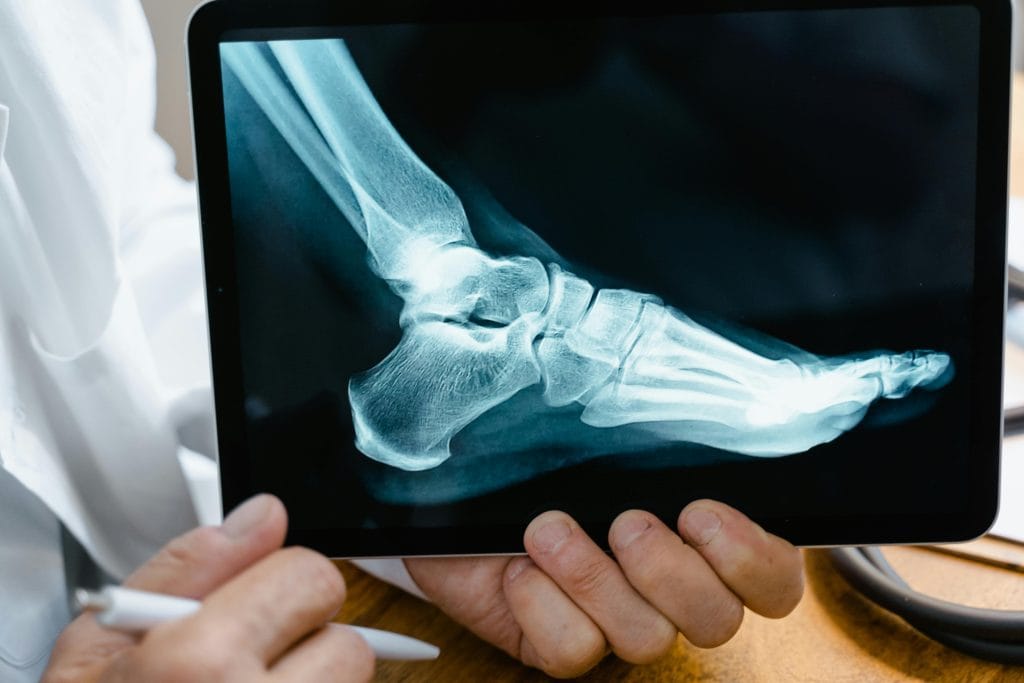Sports Injury Physiotherapy
Have you injured yourself whilst participating in sport or exercising? Sports injury physiotherapy focuses on the prevention, diagnosis, treatment and rehabilitation of physical activity related injuries. Treatment may involve manual therapy, exercise prescription, taping, and education. Referrals for imaging such as X-Ray’s or MRI’s can be completed if required and recommendation for specialist input can be advised. Treatment will help individuals regain strength, flexibility, and function with the primary goal of helping athletes and active individuals recover from injuries, enhance performance, and prevent future injuries.
Common Injuries Witt Wellness Treats
- Ankle sprains
- ACL ruptures
- MCL or LCL sprains
- Fractures
- Muscle tears
- Dislocations
- Overuse Injuries
- Tendinopathies
- Shin Splints
- Meniscus Tears

How a Physiotherapist Treats Sports-Related Injuries:
Sports injuries can be frustrating, whether you’re a professional athlete or someone who enjoys recreational activities. A physiotherapist is a key healthcare professional who can help you recover and return to your sport safely. Here’s how a physiotherapist can help:
Initial Assessment
During your first visit, the physiotherapist will conduct a thorough assessment to understand the nature and extent of your injury. They will also get to know YOU as a person which involves discussing your medical history, sport commitments, work and goals out of physiotherapy. They may also perform physical tests to evaluate your range of motion, strength, and functional abilities.
- Discussion of Injury: Understanding the type of pain you’re experiencing, other symptoms, and any functional limitations.
- Physical Examination: Assessing your range of motion, strength, joint stability, and overall biomechanics.
- Diagnostic Tools: Diagnostic special tests performed by your physiotherapist and depending on the injury, you might be referred for imaging tests like X-rays or MRIs to confirm the diagnosis.
Diagnosis
Based on your initial assessment, a diagnosis will be provided, and your physiotherapist will explain the underlying causes of your injury.
- Diagnosis Discussion: Understanding how the injury occurred and understand how that relates to your symptoms.
- Imaging: If you had any imaging such as X-Rays or an MRI, your physiotherapist will discuss the results with you.
Developing a Treatment Plan
After diagnosing your injury, your physiotherapist will create a personalised treatment plan. This plan is tailored to your specific needs and goals, typically including:
- Manual Therapy: Techniques like soft tissue massage, joint mobilisation, or passive movements to reduce pain and improve mobility.
- Therapeutic Exercises: Strengthening, mobility, and stretching exercises designed to rehabilitate the injured area.
- Modalities: Use of tools like heat/cold therapy, taping, or immobilisation to aid healing and reduce inflammation.
Pain Management
One of the primary concerns after an injury is managing pain. Your physiotherapist will use several strategies to address this, including:
- Immediate Relief: Techniques like taping, bracing, or manual therapy to alleviate discomfort.
- Education: Guidance on how to manage pain at home, such as using ice packs or gentle exercises.
- Gradual Progression: Adjusting the intensity of treatment as pain subsides to avoid overloading the injury.
Rehabilitation Goals
The ultimate goal of physiotherapy is to help you regain the function you need to participate in activity that is meaningful to you. Rehabilitation programs are structured into phases:
- Acute Phase: Focused on reducing pain and inflammation.
- Rehabilitation Phase: Emphasises restoring strength, mobility, and stability.
- Return-to-Sport Phase: Incorporates sport-specific exercises and drills to prepare you for a safe comeback.
Education and Advice
Your physiotherapist will empower you with knowledge about your injury and recovery process. This includes:
- Lifestyle Adjustments: Advising on modifications to daily activities to avoid aggravating the injury.
- Home Exercises: Providing exercises to perform at home, ensuring continued progress between sessions.
- Posture and Technique: Teaching proper movement patterns to reduce strain and prevent re-injury.
Expected Results
Understandably, you will likely want to know how long recovery will take and what outcomes to expect. While recovery timelines vary depending on the severity of the injury, your physiotherapist will:
- Set Realistic Goals: Outline short-term and long-term objectives.
- Monitor Progress: Regularly assess your improvement and adjust the treatment plan as needed.
- Discuss Influencing Factors: Explain how factors like age, overall health, and adherence to the program impact recovery.
Prevention Strategies
Preventing future injuries is as important as treating the current one. Your physiotherapist will help by:
- Injury Prevention Programs: Designing exercises to strengthen vulnerable areas.
- Warm-Up and Cool-Down Guidance: Teaching proper techniques to prepare your body for activity.
- Ongoing Maintenance: Encouraging periodic check-ups or maintenance sessions to ensure long-term health.
Expertise and Techniques
Physiotherapists bring specialised expertise to the treatment of sports injuries. You can expect:
- Experience: Many physiotherapists specialize in sports injuries and have experience treating athletes.
- Advanced Techniques: Use of innovative tools and evidence-based practices to enhance recovery.
- Collaborative Approach: Coordination with other healthcare providers, such as sports physicians or surgeons, if necessary.
Costs and Accessibility
Understanding the financial and logistical aspects of physiotherapy is important. Common questions include:
- Session Costs: Fees will vary depending on if you access treatment in clinic or via telehealth. You should also check if your private health insurance covers physiotherapy.
- Accessibility: You can access our physiotherapy services face-to-face at Balmain Sports Medicine in Rozelle, NSW or via telehealth anywhere.
Takeaway
Physiotherapy offers a comprehensive approach to treating sports-related injuries, from diagnosis to prevention. By addressing your pain, guiding your recovery, and preparing you to return to your sport, a physiotherapist can play a crucial role in your journey back to peak performance. If you’ve sustained a sports injury, don’t hesitate to consult a physiotherapist to start your recovery process.
